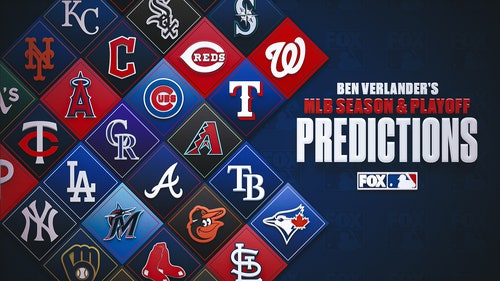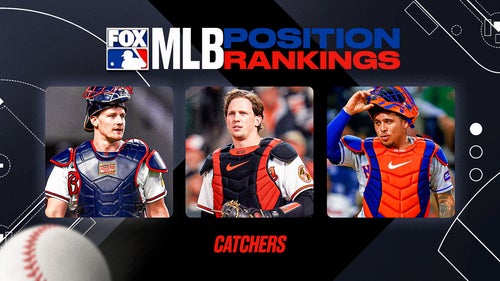
Rick Ankiel Battled Anxiety While Playing in the Majors, As Do Others
Rick Ankiel recently opened up about drinking vodka before games to help his anxiety while playing. His is not the only story of mental illness in MLB.
Being a Major League Baseball player is not always easy. There are the pressures to get better, get the big hit, make the important start and live up to the contracts that are signed. Rick Ankiel, a former big leaguer who started out as a pitcher and eventually played outfield, recently opened up about his struggles. Ankiel admitted to struggling with anxiety while pitching for the St. Louis Cardinals. Ankiel is not the only player in MLB history to deal with mental illness and he won't be the last. Opening up about his struggles is a step in the right direction to understanding why these things happen.
In the Pitching Spotlight
Ankiel broke into the majors in 1999 and played his first full season in 2000. In 2000, he had an 11-7 record with a 3.50 earned run average and finished second in the National League Rookie of the Year voting. Things were looking good for the then 21-year-old pitcher. Then, the 2000 postseason happened. In three postseason appearances (two starts), Ankiel posted a bloated 15.75 earned run average, giving up seven earned runs in just four innings of work. He threw five wild pitches in one inning against the Atlanta Braves in the NLDS that year. He had nine wild pitches in all during the postseason. After such a successful start to his career, the postseason struggles hit him hard.
An Unhealthy Pregame Preparation
After the 2000 postseason, Ankiel struggled to pitch in the majors again. He turned to alcohol to calm his nerves during his first two starts of the 2001 season. It worked during his first start, beating Randy Johnson and the Arizona Diamondbacks. The second start was not as successful. He lost to the Houston Astros and had trouble hitting the strike zone because "the anxiety took over the alcohol." That was the end of his vodka-drinking pregame preparation.
Ankiel, who is currently promoting his book The Phenomenon: Pressure, the Yips, and the Pitch that Changed My Life, which is scheduled to be released in April, talked about how he dealt with pitching before those two starts, per ESPN.com:
"Before that game … I'm scared to death. I know I have no chance. Feeling the pressure of all that, right before the game I get a bottle of vodka. I just started drinking vodka. Lo and behold, it kind of tamed the monster, and I was able to do what I wanted."
For a young man to be that scared to do something he loved had to be tough. He went on further, saying,
"I'm sitting on the bench feeling crazy I have to drink vodka to pitch through this. It worked for that game. I had never drank before a game before. It was one of those things like the yips, the monster, the disease … it didn't fight fair, so I felt like I wasn't going to fight fair either."
With his anxiety, pitching became a struggle and that made playing the game he made a living on difficult. But that didn't stop him from getting back up.
Making the Necessary Changes
Ankiel would only make 11 more MLB pitching appearances after his 2000 postseason meltdown. Only six of them were starts. He got demoted to the minors in 2001 after his struggles in the bigs continued. In Triple-A, he threw only 4.1 innings, walked 17 batters, threw 12 wild pitches and had a 20.77 earned run average. His last bit of pitching success happened later that year when he played for the rookie league Johnson City Cardinals. He was the rookie level player of the year in Minor League Baseball and was an Appalachian League All-Star.
After that, he sat out most of the 2002 and 2003 seasons with arm injuries, including undergoing Tommy John surgery in July of 2003. His last pitching appearance was in 2004. With the dream of a big league career diminishing as a pitcher, Ankiel converted to playing outfield. After missing most of the 2006 season because of a knee injury, Ankiel returned in 2007 with hopes of cracking the Cardinals roster. After much success in the minors, including a Triple-A All-Star Game appearance, he made his MLB debut as an outfielder in August of 2007.
Ankiel would go on to play seven seasons as a major league outfielder. He played for six different ball clubs and ended his career with a .240 batting average, 76 home runs and 251 runs batted in. His best season came in 2008 for the Cardinals when he hit .264 with 25 home runs and 71 runs batted in. It was easily the best season of his career as an outfielder.
More from Call to the Pen
Never Give Up
After retiring from baseball, Ankiel was hired by the Washington Nationals as a "life skills coordinator," a mentor role to help their minor leaguers. Ankiel was hired because of his newfound big league success, being able to overcome anxiety and his turbulent childhood that included his father being imprisoned for drug use.
Ankiel has overcome a lot in his life, and his big league career can teach anyone a lesson or two about life. When talking about his book, Ankiel said, "I think the overall lesson from the book is about getting back up. You're going to get knocked down … everyone gets knocked down."
We can all learn from a lesson like that, especially people who have been touched by anxiety, Directly or indirectly. Ankiel is not the only MLB player who has dealt with mental illness in the past, however.
Mental Illness Is Not a One-Time Thing in MLB
While Ankiel's battle with mental illness is the latest to be heard, it is not the first and won't be the last. Zack Greinke, one of the top pitchers in the game for years, made his social anxiety and depression known in 2006 after leaving spring training to seek help. After going on the 60-day disabled list because of psychological issues, he started seeing a psychologist and taking anti-depressants. He would return to baseball in 2007, following a time when he took a break from baseball entirely. After almost quitting baseball, Greinke went on to become a Cy Young Award winner and All-Star on his way to landing one of the biggest contracts in MLB history with Arizona.
Another story of depression and anxiety is from former MVP and current Cincinnati Reds first baseman Joey Votto. After the death of his father, Votto suffered with depression and anxiety attacks that put him in the hospital on two separate occasions. He would later go on Major League Baseball's bereavement list. While the death of his father took its toll, Votto would later come back and become the 2010 National League Most Valuable Player and make four All-Star appearances from 2010 to 2013. He makes sure to stress how important it is to have someone to talk to when addressing his mental illness.
These are just a few instances of mental illness rearing its ugly head in Major League Baseball. We can learn from their stories and remember that these men are human. As Ankiel stated and both Greinke's and Votto's stories have shown, never give up and keep fighting. Baseball may be a dream, but some have to overcome themselves before they can truly enjoy it. Hopefully many more stories can have such happy endings.










































































































































